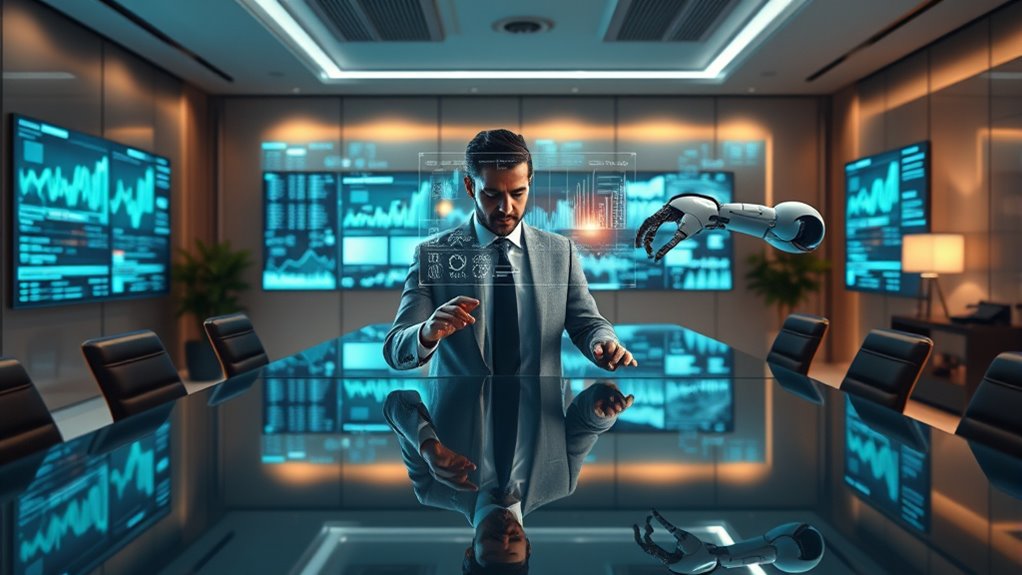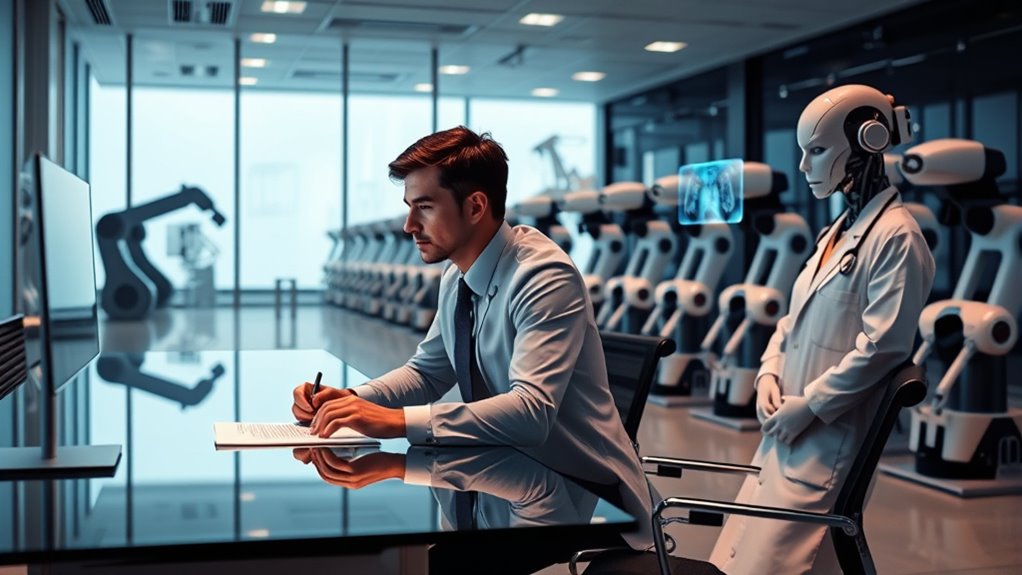AI is rapidly transforming white-collar jobs like law and medicine, automating tasks once driven by human expertise. From analyzing legal contracts to diagnosing patients, AI tools boost efficiency but also threaten job security. As automation accelerates, you’ll need to develop new skills—like understanding AI, staying adaptable, and sharpening soft skills—to stay relevant. If you want to understand how to navigate this shifting landscape, keep exploring what’s coming next.
Key Takeaways
- AI adoption in legal and medical fields is rapidly increasing, automating tasks traditionally performed by professionals.
- Generative AI enhances data analysis, decision-making, and client communication, reducing reliance on human expertise.
- Over 95% of legal professionals expect AI to become central to workflows within five years.
- Automation is causing significant job displacement, with thousands of roles eliminated in 2024 alone.
- Continuous skill development and adaptation are essential for professionals to stay relevant amid technological disruption.
The Surge of AI in Professional Fields

The surge of AI in professional fields is transforming how work is done across industries. You’ll notice AI adoption skyrocketing, especially in legal, tax, accounting, and government sectors. From 2024 to 2025, generative AI use nearly doubled in the legal industry alone. Organizations are actively integrating AI into their strategies, updating policies, and training staff to keep pace. Over 95% of legal professionals expect AI to become central to their workflows within five years. AI isn’t just automating routine tasks; it’s enhancing data analysis, decision-making, and client communication. This shift reflects a broader trend—companies are leveraging AI to improve efficiency and drive bottom-line impacts. As AI becomes a core part of professional work, you’ll need to adapt quickly to stay relevant and competitive. The integration strategies show that organizations are taking deliberate steps to embed AI into their long-term plans and operational frameworks. Understanding how to adapt to technological change is crucial as AI continues to reshape the professional landscape, especially as advancements in AI security influence the way professionals present and collaborate. Additionally, staying informed about legal residency requirements and procedural updates can help professionals navigate the evolving regulatory environment effectively. Recognizing the importance of emotional support in managing workplace transitions can also foster healthier adaptation during this technological shift.
Disruption in Legal and Medical Sectors

AI’s rapid integration into professional fields is now shaking up legal and medical sectors in tangible ways. In the legal world, AI tools are automating tasks like drafting correspondence (54%), analyzing contracts, and providing real-time case insights through predictive analytics. You’re likely to see more lawyers using generative AI (31%) for individual work, streamlining workflows with low-code automation. Recognizing the importance of Cultural Intelligence can help professionals navigate diverse client and stakeholder needs as these technological changes accelerate. In healthcare, AI enhances diagnosis accuracy, analyzes vast datasets, and personalizes treatments based on genetic and lifestyle data. Additionally, AI accelerates medical research and improves telemedicine platforms for remote care. These changes lead to:
- Increased operational efficiency
- Reduced manual labor and costs
- Growing reliance on AI-driven decision-making
- Emerging ethical and regulatory challenges
Furthermore, the adoption rate of AI in law firms with 51+ lawyers is at 39%, reflecting a significant shift toward automation in larger organizations. This disruption signals a fundamental shift in how legal and medical professionals operate daily, emphasizing the importance of AI-driven tools in maintaining competitiveness and adapting to ongoing innovations.
The Evolving Skill Set for White-Collar Workers

As automation transforms white-collar industries, you must evolve your skill set to stay relevant. Traditional skills like communication, critical thinking, adaptability, time management, and technical competence remain essential. But now, emerging skills are equally important. You need to understand environmental impacts through carbon intelligence, master virtual communication and digital etiquette, and develop AI proficiency to work effectively with new tools. Hybrid work models demand that you adapt to both remote and in-office environments, while digital literacy remains foundational. Continuous learning is vital; you must upgrade technical skills regularly and sharpen soft skills like empathy and creativity. Staying informed about industry trends and technological advancements, including vetted tools and safety standards, is crucial for maintaining a competitive edge. Developing space and organization skills, such as efficient workspace management and decluttering, can enhance productivity and mental clarity. Additionally, understanding basic food safety principles, such as proper storage and spoilage signs, can improve personal well-being and workplace efficiency. Embracing new technologies and standards like those in the paint sprayer zone can further improve operational efficiency and safety practices. Future success depends on your ability to integrate these new competencies, stay agile, and embrace innovation in a rapidly changing landscape.
Challenges of Reskilling and Job Security

Reskilling and job security remain significant challenges as automation continues to reshape white-collar workplaces. You face difficulties because AI is replacing tasks in finance, law, healthcare, and tech, leading to higher displacement rates. Reskilling programs are often inaccessible or insufficient in fields requiring specialized knowledge. Additionally, economic shifts accelerate job losses, and the reduction of entry-level roles worsens competition. Consider these challenges:
- AI replacing professional tasks, reducing hiring in sectors like finance and law.
- 14% of workers experiencing displacement, with future losses expected.
- Limited access to effective, specialized reskilling programs.
- Increased competition due to outsourcing and fewer entry-level opportunities.
- The global workforce is rapidly adapting to these changes, but many struggle to keep pace, especially as the need for ongoing learning and adaptation becomes more critical in the face of technological advancement. Moreover, integrating music therapy techniques in training programs could potentially ease some of the stress associated with these transitions, as research shows that emotional well-being plays a key role in successful reskilling efforts.
These factors make it harder for you to adapt, maintain job security, and stay relevant in an evolving job market.
Navigating the Future of Work Amid Automation

The rapid adoption of automation is fundamentally reshaping the white-collar job landscape, creating both challenges and opportunities for workers. As AI replaces routine tasks, many entry-level and junior roles in finance, law, consulting, and marketing are disappearing, limiting career entry points. The “Super-Exponential Effect” accelerates job displacement faster than before, with professional service openings hitting their lowest since 2013. Meanwhile, over 40% of employers plan to cut roles where AI can automate, and major companies have already eliminated over 127,000 jobs in 2024. Despite widespread anxiety, many workers see AI as a tool to boost productivity. To navigate this future, you’ll need to adapt, reskill, and seek new pathways, all while understanding that workforce transformation is inevitable and ongoing. Current impact shows 14% of workers have experienced job displacement due to AI, highlighting the urgency for proactive adaptation. Additionally, the All-Waterpark hotel options in Orlando exemplify how industries are diversifying to meet changing demands and provide innovative experiences. Recognizing the importance of personality development can also help workers build resilience and adaptability in this shifting landscape. Developing resilience strategies can empower individuals to better cope with ongoing changes in the workforce environment, especially as technological advancements continue to evolve at a breakneck pace.
Frequently Asked Questions
How Quickly Will AI Completely Replace Human Professionals in White-Collar Jobs?
You wonder how fast AI will fully replace human professionals in white-collar jobs. Currently, AI is rapidly automating tasks, with the “Super-Exponential Effect” speeding up job displacement. While complete replacement may take years or decades, the trend shows AI continuously taking over roles like legal research, finance, and healthcare tasks. To stay relevant, you need to upskill and adapt, as the job landscape is transforming faster than you might expect.
What Ethical Concerns Arise From AI Replacing Legal and Medical Professionals?
Think of AI replacing professionals like a double-edged sword—offering progress but cutting deep ethically. You face risks of mishandling sensitive data, which can harm trust. Biases in AI can lead to unfair outcomes, and lack of transparency makes accountability tough. You also worry about losing human oversight, which is essential for ethical decisions. Balancing innovation with responsibility requires careful guidelines, oversight, and ongoing ethical assessments to protect both professionals and clients.
How Can Organizations Effectively Manage Employee Fears About Automation?
You can manage employee fears about automation by being transparent about its goals and impacts. Engage staff early, solicit feedback, and involve them in planning to foster ownership. Offer training and career development opportunities, highlight success stories, and create a supportive workplace culture that values mental health. Communicate clearly, listen actively, and provide resources to help them adapt, reducing uncertainty and building trust in your automation initiatives.
What Industries Are Least Affected by Ai-Driven Job Displacement?
Think of certain industries like sturdy ships in a storm—less likely to be knocked off course by AI. You’ll find healthcare, education, social services, and creative fields least affected because they rely on human empathy, adaptability, and originality. Skills like emotional intelligence and physical tasks make automation challenging. These sectors remain resilient, so your focus should be on developing these uniquely human skills to stay relevant and thrive in the evolving job market.
Will AI Create More Jobs Than It Eliminates in the Long Term?
You might wonder if AI will create more jobs than it eliminates long-term. The good news is, despite displacing millions, AI is expected to generate around 170 million new jobs by 2030, leading to a net gain of about 78 million. As AI accelerates, new roles in tech, machine learning, and other fields will emerge, offering opportunities for those willing to adapt and develop new skills.
Conclusion
As you step into this evolving landscape, remember that change often gently nudges us toward new horizons. Embracing continuous learning and adaptability will help you stay ahead of the shifting tide. While automation may reshape roles, your unique skills and resilience will remain valuable. So, view these transformations as opportunities to grow and innovate, turning potential challenges into stepping stones for a brighter, more dynamic future in your profession.









